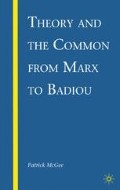Abstract
By the use of the word “genealogy,” I do not mean to imply that I am now going to write a history of the term “common sense.” Rather, I want to reimagine a certain practice of language—a style—that breaks open the self-containment of philosophy, which has been understood, at least since the Greeks, even if in the guise of medieval theology and later early modern science, as the highest and purest form of natural language. Hegel represented the culmination of this linguistic perspective and therefore became the condition, or the occasion, of its breakdown. There are several names associated with this breakdown, and one of the more humorous is Max Stirner, the pseudonym of the man who was the object of Marx and Engels’s diatribe “Saint Max” in The German Ideology. Not too long ago, in his belated reading of Marx, Derrida conjured up the spirit of Stirner in a way that cast him as Marx’s double, someone who had anticipated the Marxian exorcism of ideological specters.1 Stirner wanted to rid humankind of its ghosts—by which he meant their higher being or essence—by centering everything on a material ego that expresses the principle of self-ownership.
Access this chapter
Tax calculation will be finalised at checkout
Purchases are for personal use only
Preview
Unable to display preview. Download preview PDF.
Notes
Jacques Derrida, Specters of Marx, trans. Peggy Kamuf (New York: Routledge, 1994), 139–40. For the original French edition consulted here and below, see Spectres de Marx (Paris: Éditions Galilée, 1993).
Karl Marx and Frederick Engels, The German Ideology, in Collected Works, vol. 5 (London: Lawrence & Wishart, 1976), 44; henceforth GI. For the German edition consulted here and below, see Die deutsche Ideologie, in Werke, Band 3 (Berlin: Dietz Verlag, 1959), henceforth DI.
Max Stirner, “Stirner’s Critics,” abridged and trans. Frederick M. Gordon, The Philosophical Forum 8.2–4 (1977), 68–69. For the German edition consulted here and below, see “Rezensenten Stirners” (Sept. 1845), in Parerga, Kritiken, Repliken, ed. Bernd A. Laska (Nürnberg: LSR-Verlag, 1986), 147–205.
The Marx-Engels Reader, ed. Robert C. Tucker (New York: Norton, 1978), 4.
Max Stirner, The Ego and Its Own, ed. David Leopold (Cambridge: Cambridge University Press, 1995), 7.
Derrida, Specters, 121; Jean-Michel Rabaté, James Joyce and the Politics of Egoism (Cambridge: Cambridge University Press, 2001), 50–53.
Jacques Lacan, Encore, book 20 of Le séminaire, ed. Jacques-Alain Miller (Paris: Seuil, 1975), 24.
Karl Marx, “Contribution to the Critique of Hegel’s Philosophy of Right,” in Early Writings, trans. and ed. T. B. Bottomore (New York: McGraw-Hill, 1963), 52.
Nancy S. Love, Marx, Nietzsche, and Modernity (New York: Columbia University Press, 1986), 17.
Friedrich Nietzsche, The Gay Science, trans. Walter Kaufmann (New York: Vintage Books, 1974), 201–2; Werke in Drei Bänden, ed. Karl Schlecta, Band 2 (München: Carl Hanser Verlag, 1954), 144.
Friedrich Nietzsche, On the Genealogy of Morals and Ecce Homo, trans. and ed. Walter Kaufmann (New York: Vintage Books, 1969), 78–79.
Friedrich Nietzsche, Beyond Good and Evil, trans. Walter Kaufmann (New York: Vintage Books, 1966), 13–14.
Henry Staten, Nietzsche’s Voice (Ithaca: Cornell University Press, 1990), 32.
Pierre Bourdieu, The Logic of Practice, trans. Richard Nice (Stanford: Stanford University Press, 1990), 28.
Karl Marx, Grundrisse: Foundations of the Critique of Political Economy, trans. Martin Nicolaus (New York: Vintage Books, 1973), 634, 704–6 and passim.
Copyright information
© 2009 Patrick McGee
About this chapter
Cite this chapter
McGee, P. (2009). Genealogies of Common Sense. In: Theory and the Common from Marx to Badiou. Palgrave Macmillan, New York. https://doi.org/10.1057/9780230620605_3
Download citation
DOI: https://doi.org/10.1057/9780230620605_3
Publisher Name: Palgrave Macmillan, New York
Print ISBN: 978-1-349-37899-9
Online ISBN: 978-0-230-62060-5
eBook Packages: Palgrave Social & Cultural Studies CollectionSocial Sciences (R0)

